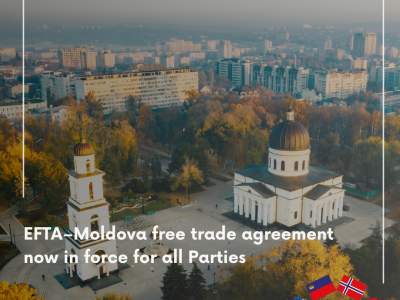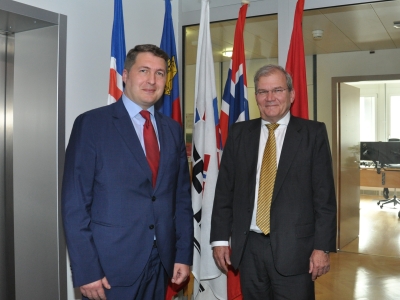About
On 24 March 2023, EFTA and the Republic of Moldova reached an agreement on a comprehensive free trade agreement. Further details can be found in a Chapter by Chapter Fact sheet on the free trade agreement. The EFTA-Moldova FTA entered into force on 1 September 2024 for Moldova and Iceland, on 1 November 2024 for Norway, and on 1 April 2025 for Liechtenstein and Switzerland.
In 2021, EFTA and Moldova launched their negotiations towards a free trade agreement. Parties had formalized their shared ambition of strengthening their economies by signing a Joint Declaration on Cooperation in Geneva, Switzerland, on 24 November 2017.
Key facts
- Population
2,538,890
- GDP
$ 14,508.33 M
- Date of Signature of the Agreement
24.11.2017
(Joint Declaration on Cooperation)
27.06.2023
(FTA)
- Date of Entry Into Force
01.09.2024
(Moldova, Iceland)
01.11.2024
(Norway)
01.04.2025
(Liechtenstein, Switzerland)
- Imports to EFTA States
EUR 31 M
- Exports from EFTA States
EUR 71 M
Information about agreement
Summary
As an ambitious and broad-based Free Trade Agreement, the EFTA-Moldova Agreement covers trade in goods and services, establishment, intellectual property rights, competition, government procurement, trade and sustainable development, as well as legal and horizontal provisions. For the first time, it also contains a chapter on e-commerce.
Trade between the parties has been growing exponentially over the last ten years. In 2022, total trade reached USD 94 million between the EFTA States and the Republic of Moldova, of which USD 34 million represented imports from Moldova and USD 60 million were exports from the EFTA States. Exports from EFTA States to Moldova had an average annual growth rate of 21.9% over the last five years.
Negotiations towards the comprehensive Free Trade Agreement were preceded by a Joint Declaration on Cooperation, signed in November 2017. At a Joint Committee meeting held in May 2018, opportunities to strengthen economic relations and enhance cooperation were further explored. Between March 2021 and March 2023, five full negotiation rounds and several intersessional meetings were held.
Free Trade Agreement
Annexes and Record of Understanding
PAPs notifications
Joint Declaration on Cooperation
The Joint Declaration on Cooperation (JDC) addresses cooperation on trade-related issues such as exchange of information on trade in goods and services, customs and origin matters, technical barriers to trade, intellectual property rights, public procurement markets, competition, and trade and sustainable development.
Furthermore, the Joint Declaration on Cooperation aims to promote private sector trade and investment cooperation.
A Joint Committee is established which provides the EFTA States and Moldova with a forum and a practical framework to review their cooperation, discuss any other issue of mutual interest and formulate appropriate recommendations.
The Joint Declaration on Cooperation provides that the EFTA States and Moldova shall, when conditions permit, jointly examine actions to be taken in view of establishing a free trade area between them.
Statistics
For EFTA-Moldova trade statistics, see EFTA Trade Statistics Tool


